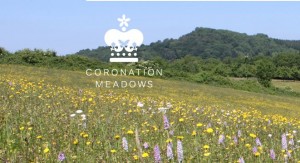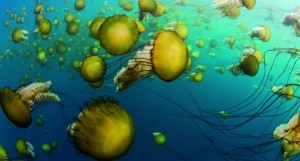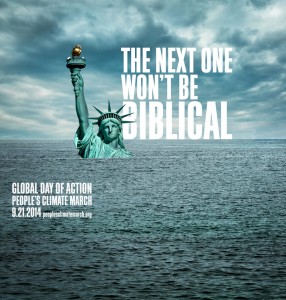People’s Climate March: Ubuntu: We Have a Duty to Persuade Our Leaders
We can. You and you and you, and me.
And it is not just that we can stop it, we have a responsibility to do so that began in the genesis of humanity, when
“to till it and keep it”. To “keep” it;
not to abuse it, not to make as much money as possible from it, not to destroy it.”
— Desmond Tutu —
Extracts from an article by Desmond Tutu writing in the Observer on the day of the biggest global call-to-action on Climate Change in history.
Marches and protests took place worldwide. Organisers in Manhatten said some 310,000 people joined the march, including Secretary General of the United Nations, Ban Ki-moon.
“This is the planet where our subsequent generations will live,”
Mr Ban said: “There is no ‘Plan B’ because we do not have ‘Planet B’.”
The People’s March has been organised just ahead of the United Nations Climate Summit in New York next week. Campaigners are demanding curbs on carbon emissions along with changes in law which would prevent a continuation of the unprecedented levels of damage currently being done to humans and the environment by unfettered psychopathic and antisocial corporate greed.
(Comment by RZ, not Desmond Tutu)
The complete article can be read here: Desmond Tutu: We fought apartheid. Now climate change is our global enemy
“As responsible citizens of the world – sisters and brothers of one family, the human family, God’s family – we have a duty to persuade our leaders to lead us in a new direction: to help us abandon our collective addiction to fossil fuels, starting this week in New York at the United Nations Climate Summit.”
“Just as we argued in the 1980s that those who conducted business with apartheid South Africa were aiding and abetting an immoral system, we can say that nobody should profit from the rising temperatures, seas and human suffering caused by the burning of fossil fuels.“
“We can boycott events, sports teams and media programming sponsored by fossil fuel companies; demand that their advertisements carry health warnings; organise car-free days and other platforms to build broader societal awareness; and ask our religious communities to speak out on the issue from their various pulpits. We can encourage energy companies to spend more of their resources on the development of sustainable energy products, and we can reward those companies that demonstrably do so by using their products to the exclusion of others.”
We can encourage more of our universities and municipalities, foundations, corporations, individuals and cultural institutions to cut their ties to the fossil fuel industry. To divest, and invest, instead, in renewable energy. To move their money out of the problem and into the solutions.
People’s Climate March Design Contest
We can urge our governments to invest in sustainable practices and stop subsidising fossil fuels; and to freeze further exploration for new fossil energy sources. The fossil reserves that have already been discovered exceed what can ever be safely used. Yet companies spend half a trillion dollars each year searching for more fuel. They should redirect this money toward developing clean energy solutions.
We can support our leaders to make the correct moral choices and to avoid undue industry influence that blocks the political will to act on climate change. Through the power of our collective action we can hold those who rake in the profits accountable for cleaning up their mess.”
The good news is that we don’t have to start from scratch. Young people across the world have identified climate change as the biggest challenge of our time, and already begun to do something about it.
Once again, it is a global movement led by students and faith groups, along with hospitals, cities, foundations, corporations and individuals. It is a moral movement to persuade fossil fuel companies away from a business model that threatens our very survival.
My prayer is that humankind takes its first tangible steps in New York this week – as a collective – to move beyond the fossil fuel era.
“There is a word we use in South Africa that describes human relationships: Ubuntu. It says: I am because you are. My successes and my failures are bound up in yours. We are made for each other, for interdependence. Together, we can change the world for the better.”
People’s Climate March Design Contest Winning Designs
The contest had two winning designs which will form the basis of a creative NYC subway ad campaign that will highlight both the depth of the climate crisis facing us, and the hope that organized people power can push our governments to take bold action. The winners are:
James Jean with “Winds of Change”, and Ellie and Akira Ohiso with “The Next One won’t be Biblical”
Read More
Your Name on the Arctic Sunrise
It belongs to all of us.
Don’t let them destroy it.
PUT YOUR NAME ON THE ARCTIC SUNRISE – HERE
Help protect this important and unique environment and its inhabitants by supporting Greenpeace with a donation to help fund their work. After months without proper maintenance while in Russian custody, their ship the Arctic Sunrise requires a thorough overhaul and refitting including the replacement of equipment removed by the Russian authorities.
The Arctic Sunrise so when she sails into the sunrise, we all sail with her.
People who care about the planet believe that there should be a global sanctuary in the Arctic, which will help preserve its unique wildlife and habitat and allow the Arctic to continue to help stabilise the world’s climate.
More Information Available on SaveTheArctic.org
Why does the Melting of the Arctic Sea Ice Matter to Me?
More info on SavetheArctic.org
Rosneft is a massive Russian company whose pipelines spill over 2,000,000 tons per year. Now it’s moving into Arctic waters, where it plans to build over 100 rigs.
Together with Exxon, Rosneft plans to drill in an area overlapping the Russian Arctic National park, a sanctuary for polar bears, walrus and narwhals.
The Arctic could be devastated.
All for a few last drops of oil.
Environmental Activist
As an exemplary environmental activist, The Arctic Sunrise has taken part in campaigns and protests across the world, from withing 450 miles of the North Pole, to Antarctica’s Ross Sea, and it has Navigated both the Congo and the Amazon rivers, raising awareness of issues threatening the areas. Among other things, it has campaigned to stop whaling, taken part in protests in support of sustainable fishing, taken action to stop North Sea trawlers fishing cod towards extinction and campaigned against the Star Wars weapons programme.
The Arctic Sunrise is classified as a “1A1” Icebreaker – the second highest ice strengthening notation at the time of her construction in 1975. She was originally used as a seismic survey vessel, named Polarbjørn (“polar bear”) and was later used by the French Government. Greenpeace purchased the ship in 1995, having resorted to forming a “shell company” called “Arctic Sunrise Ventures Ltd” through which it made the purchase as the previous Norwegian owners had refused to sell the ship to Greenpeace.
Read MorePrince Charles Coronation Meadows
The UK has lost 97 of its Wildflower Meadows in 75 years
Prince Charles came up with the idea after having read the report by the charity Plantlife which showed that the UK has lost 97% of its wildflower meadows in the last 75 years. Wildflower meadows support a far wider range of plants species, compared with agricultural meadows, and the loss has seriously affected the plant species and wildlife that rely on them.
Each meadow will be a donor site to its own county, with hay and seed collected from it being used to create new meadows in the same area.
Nearly 80% of the meadows so far identified for the project, can trace an undisturbed history back to before the Coronaton, and in some cases for hundreds of years.
One of the benefits of using this method is that the local characteristics and rich diversity of the grasslands in each area will be maintained, an outcome that would not be possible to achieve by using generic seed mixes which are unable to reproduce that level of diversity.
The meadows range in size from the tiny Hayton meadow in Shropshire, which is three-quarter of an acre, to the 400 acre Therfield Heath in Hertfordshire home to the largest population of pasque flower in Britain,
Many of the meadows are grazed with native breeds of animals which helps wild flowers survive.
In a statement His Royal Highness The Prince of Wales said: ‘My Coronation Meadows idea came to me when I read Plantlife’s 2012 report and fully appreciated just how many wildflower meadows had been lost over the past 60 years. This year, we are celebrating my mother’s coronation so surely there is no better moment to end this destruction and to stimulate a new mood to protect our remaining meadows and to use them as springboards for the restoration of other sites and the creation of new meadows right across the UK.’
‘His Royal Highness has given us a challenge’ explains Plantlife Chief Executive, Victoria Chester ‘to conserve species and yet to maintain their essential wildness. In an age where we too often turn to the quick-fix of commercial ‘nectar mixes’, Coronation Meadows is both a celebration and a pledge to our children and grandchildren, using the floral riches of the past to create meadow gems for the future.’
 ‘Restoring meadows is painstaking, long-term stuff – it is about our landscape history and our cultural heritage. Many of the meadows have local significance. For example, Welsh farms often had a Cae Ysbyty or “Hospital Field”, a flower-rich pasture where sick animals would recover from illness or injury faster than on conventional pasture. This project is so resonant because it reminds us just how spectacular and wildlife-rich our countryside can look – and the results can be simply breathtaking.’
‘Restoring meadows is painstaking, long-term stuff – it is about our landscape history and our cultural heritage. Many of the meadows have local significance. For example, Welsh farms often had a Cae Ysbyty or “Hospital Field”, a flower-rich pasture where sick animals would recover from illness or injury faster than on conventional pasture. This project is so resonant because it reminds us just how spectacular and wildlife-rich our countryside can look – and the results can be simply breathtaking.’
http://coronationmeadows.org.uk/
Read MorePaul Snelgrove: Making Ocean Life Count
“How inappropriate to call this planet Earth when it is quite clearly Ocean.”
— Arthur C. Clark
The world’s first comprehensive Census of Marine Life — past, present, and future — was released in 2010 in London, at the same time that Paul Snelgrove released his book: Discoveries of the Census of Marine Life: Making Ocean Life Count.
 The Census of Marine Life was started by two scientists who realised that the Oceans were in trouble and we were doing nothing about it.
The Census of Marine Life was started by two scientists who realised that the Oceans were in trouble and we were doing nothing about it.
Planet Ocean
Although the oceans cover some 70% of our planet, providing more habitat than all other habitat combined, and produce about half of the new life everyday on earth as well as about half of the oxygen that we breathe, we know more about the surface of the Moon and about Mars than we do about the oceans
The Census project was undertaken by a global network of 2700 scientists from more than 80 nations who engaged in a 10-year scientific initiative assess and explain the diversity, distribution, and abundance of life in the global ocean.
The three main components of the census were organised around the questions:
What has lived in the oceans?
What does live in the oceans?
What will live in the oceans?
They wanted to construct the history of marine animal populations since human predation became important – roughly the last 500 years. The Roman development of salting fish as a means of preservation changed fishing patterns from one of purely catching “the meal for the day” to industrial scale fishing.
New Technologies
The study examined and used new technologies to explore unknown species and habitats, migration routes and distribution patterns, how the oceans are changing and what we can expect from them in the future.
New technologies facilitated research, remotely operated vehicles combined with satellite communication enabled distant scientists to participate in scientific investigations thousands of miles away, and the new science of genetic bar coding , developed by geneticists enabled the exact recognition of fish species.
Results have been quite astounding, with 4-5 new species from the ocean being described each day. The information has proved extremely valuable already in many ways, for example, scientists in the Gulf of Mexico had just taken a census of species in the gulf which proved very useful when the Gulf Oil Spill happened , to establish a clear idea of how marine life in the area had been affected.
Paul Snelgrove gives a fascinating talk supported by illuminating graphics and astounding photographs.
Read More




